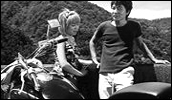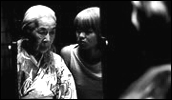Firefly Dreams
- Year
- 2001
- Original title
- Ichiban Utsukushii Natsu
- Japanese title
- 一番美しい夏
- Director
- Cast
- Running time
- 104 minutes
- Published
- 21 September 2001



by Jasper Sharp
I don't know, the kids of today - what can you do with them? You can almost sympathise with the scenario veteran director Kinji Fukasaku rather playfully puts forward in his Battle Royale of sticking them on a deserted island with their schoolbags filled with a variety of deadly implements and leaving them to get on with it.
17-year-old Naomi is one of a million such aimless teenagers, a Shibuya-girl wannabe, bottle blonde and face plastered in orange foundation, mobile phone grafted to her head and her pink lipsticked pout puffing petulantly at a cigarette as her mother gives her a dressing down for skipping school and staying out all night. Fortunately for this bolshie city brat, her mother's methods of parental control are a little less extreme than Fukasaku's. Instead she ships the errant teen off from her home in Nagoya to spend the summer in the country working at a rural inn owned by her older brother and his wife.
At first the change of environment seems to be doing little for the restless young girl, her face like the proverbial slapped arse as she waits on tables of drunken middle-aged men, continuously griping at the incessant nattering of her educationally sub-normal cousin Yumi. Seeing that things are not working out, her aunt instead suggests that she look after an aging relative, Mrs Koide, who lives alone on a small farm where Naomi used to play as a small child. Koide-san, however, is slowly losing her faculties to Alzheimer's and much to Naomi's chagrin doesn't even remember her as a small girl.
Initially the two respectfully keep their distance from one another, with Naomi being of little assistance in the farmyard chores as, rather than chipping her nail varnish she leaves the resilient but dignified older woman to get on with such day-to-day duties as beheading chickens for the local inn. However, as she spends more time at the farm the ice begins to melt, and she soon comes to realise that the "daft old cow" once had a pretty adventurous life of her own, working in a munitions factory in Tokyo during the war and even appearing in a film called "Among the Fireflies". As the summer progresses, the two women find that beyond the age gap they have considerably more in common than they first thought.
The past few years in Japan have seen quite a run of dramas featuring rebellious, directionless teenage girls, running from Masato Harada's Bounce KoGals (1997), to Ryuichi Hiroki's Tokyo Trash Baby (Tokyo Gomi Onna, 2000) and Kaze Shindo's Love / Juice (2000). Firefly Dreams, with its grounding in the "rite of passage" genre also sits neatly alongside the recent strain of films (Makoto Shinozaki's Not Forgotten / Wasurerarenu Hitobito, for example) that contrast this lost generation with their older counterparts to suggest just how far the offspring of Japan's 1980s bubble economy have totally lost touch with their roots.
As such, Naomi and Koide-san's cross-generation friendship holds a far broader appeal to similar media-driven, materially obsessed pop-cultures, so whether we should make anything of the fact that the film was written, directed, edited and co-produced by an Englishman, born and bred in St Albans, who first came over to Japan in 1988 and has lived there ever since, is rather a moot point. Aside from a couple of English names on the credits list, Firefly Dreams is ostensibly a Japanese film using an all Japanese cast and targeted at a Japanese audience whilst dealing with a universal issue. It admirably avoids projecting a foreigner's perspective on proceedings and digs deep beneath the surface superficialities of the cultural divide to touch on something far more emotionally resonant.
The arguably slight premise of the story is embellished by the touching interplay between newcomer Maho Ukai and the 85-year-old Yoshie Minami, a veteran of the stage who started off playing men in the cross-gender otokoyaku parts for the Takarazuka Review (an all-female equivalent to the exclusively male field of Kabuki theatre) and is now a familiar face thanks to her loveable grandmother roles on television. Similarly noteworthy is the beautiful photography of the Horaicho region in the Aichi Prefecture in central Japan, bringing a seductive calmness to the screen as it evokes its rural idyll and which, like Naomi Kawase's films, depicts a side of Japan seldom seen by foreigners.
It will be interesting to see what sort of reaction John Williams's debut gets from the critics, both within Japan and abroad, as there's a lot more of interest here beyond the novelty of a non-Asian making a feature drama within Japan for a Japanese market. It's a definite slowburner, low-key but assured, but a refreshingly sincere and heartfelt debut nonetheless.